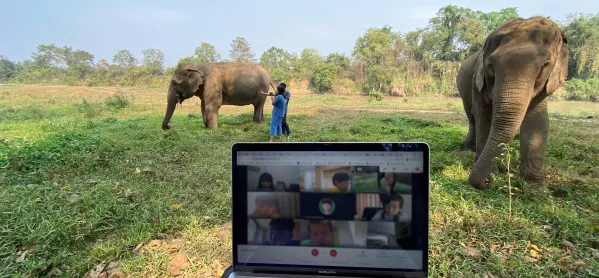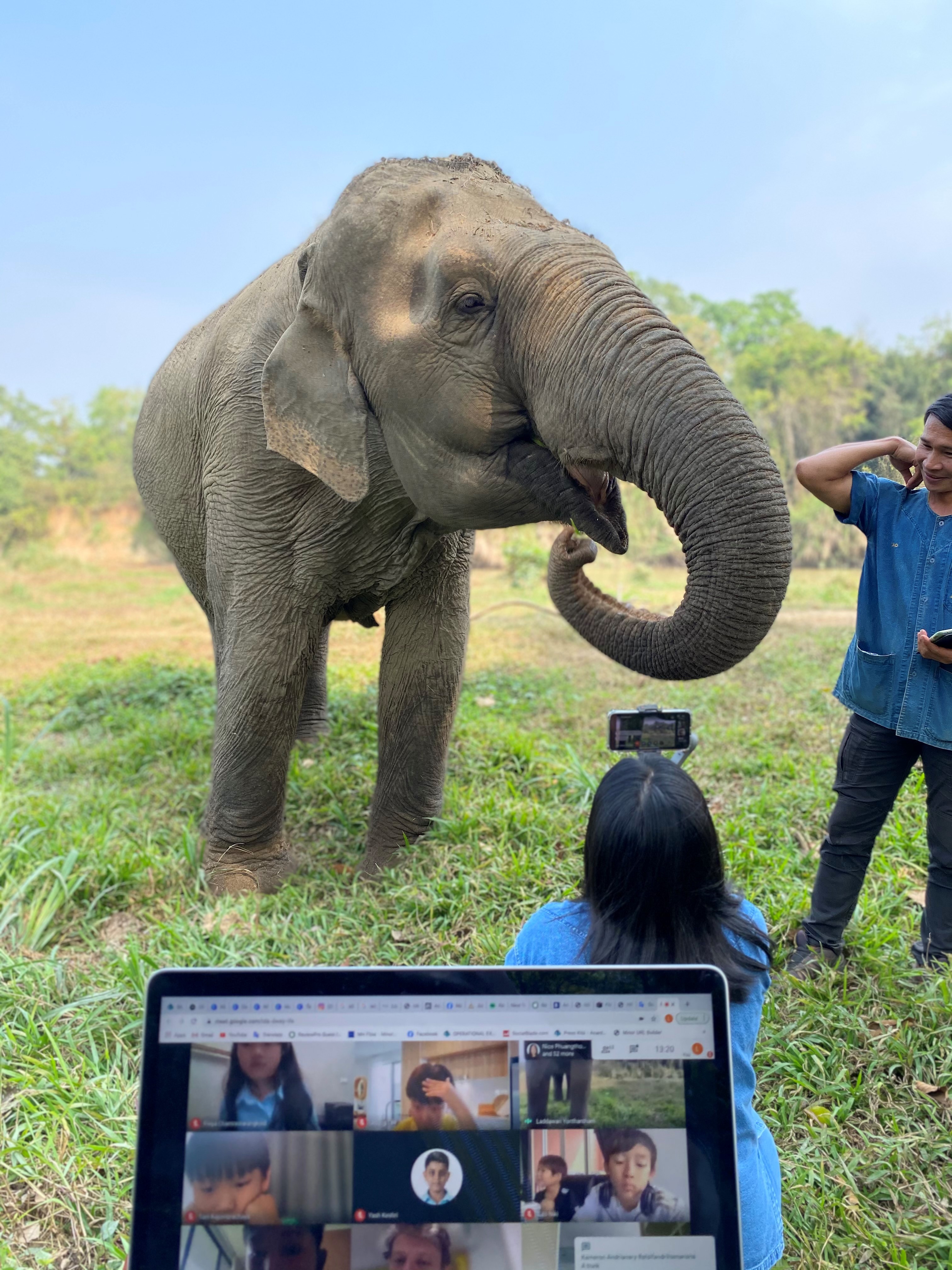Pupils will never forget their virtual elephant safaris

It was one of the more eye-catching emails to arrive in my inbox.
“Would your pupils like to meet our elephants on an educational online call?”
I was keen to read on.
It was from the Golden Triangle Asian Elephant Foundation (GTAEF), a conservation group that runs an elephant sanctuary located approximately 900 kilometres north of Bangkok at the remote point where the borders between Thailand, Myanmar and Laos meet. A very different place from the city-based international school where I teach.
They explained that their usual business offering “elephant experiences” to tourists had seen few visitors after the pandemic forced the government to close Thailand’s borders last year.
Having previously offered the occasional Skype lesson for students, the GTAEF was looking to ramp this up and reach out to schools on a larger scale. Would we like to be involved?
Virtual elephant safaris: Teaching about environmental sustainability
After a brief chat with my colleague, Susan Whalley, the answer was an obvious yes - and we decided to trial the scheme in Year 1 and Year 4.
As environmental sustainability coordinators, our job is to integrate environmental education into the school’s provision, and the idea of virtual field trips to meet Asian elephants, categorised as endangered, was a perfect fit.
Of course, it was going to be fun - but it had to have a learning focus too, so we drew up a list of what we wanted the children to learn.
For Year 1 pupils, we looked at naming elephant body parts, understanding diets and their habitats and how we can look after elephants. For Year 4 pupils, we looked at elephant behaviours and conservation problems, and their solutions.
In particular, this focus in Year 4 aligned with our desire to present children with real-world problems and then show them solutions that make a difference.
Pre-safari learning
To start with, each class teacher involved hosted an online introductory lesson where pupils learned about an elephant named Boon Rod that had been taken in by the GTAEF when her elephant camp, which offered rides to tourists, had closed down.
The Year 4s learned how the GTAEF has supported Boon Rod, her mahout (elephant keeper) and his family, during the tough economic times caused by the pandemic.
This introduction gave the learning a real-world context and highlighted wider impacts of the pandemic that the children may not have thought about before. From this, Year 4 pupils created questions to ask the experts in preparation for their online excursion.
Meanwhile, our Year 1s set about making and decorating toilet-roll binoculars and some prepared safari costumes - essential gear for the upcoming Google Meets! They were also introduced to Boon Rod, and thought of their own questions, too.
Look, elephants, there!
Then came the “safari days” themselves - as you can imagine, excitement was high.
Separate “virtual field trips” were organised for each age group, enabling the presenters to pitch their talks to the differing classes. Each session lasted 30 minutes with 40 to 60 children (two to three classes at a time) logged in from home.
Armed with a laptop, smartphone and selfie stick, the presenter, Laddawan Yonthantham, appeared. Starting off with an informative introduction, she then set off across the grassland in search of elephants.

The young faces filling my screen lit up with delight when we spotted three elephants enjoying a meal in the shade. Comments of “Wow!”, “OMG!” and plenty of happy emojis popped up in Google Meet’s instant messages from teachers and children alike. The questions, designed previously, were eagerly typed in.
Of course, some children became a bit overeager in wanting their questions answered - requiring us to switch off the chat and create a “one question, asked once” rule. This was the only time the process became tricky to manage.
We got to witness moments of drama when a group of elephants that were bathing in the nearby river rushed up on to the banks trumpeting, chasing each other, and surprising everyone with their antics.
A long-term connection
A week later, Thailand’s schools reopened and we were back in the classroom - but we kept the virtual elephant safaris going and now some 970 pupils and their teachers - everyone from Foundation Stage to Year 6 - have had the experience.
This has had a huge knock-on impact on educational ideas in school, with the “virtual field trips” providing a common theme that every pupil could connect with and inspiring a whole-school focus with further learning and activities in all year groups.
My colleagues have planned a special Book Week with the children working on collaborative e-books about elephants, while a fundraising initiative involving each class working on a piece of art to be auctioned to parents in aid of the sanctuary is also scheduled.
What’s more, the success of the partnership shows that we can find new and innovative ways to engage pupils in real-world experiences that boost learning - and highlights the real people working to solve our conservation and sustainability problems.
Such learning brings not only reality to pupils, but also hope. Hope that we really can fix the planet on which we all depend.
Ewen McLeish is a teacher and environmental sustainability coordinator at St Andrews International School, Bangkok. He also writes about sustainability. The GTAEF continues to offer virtual field trips to schools worldwide, including those within the UK’s time zone
You need a Tes subscription to read this article
Subscribe now to read this article and get other subscriber-only content:
- Unlimited access to all Tes magazine content
- Exclusive subscriber-only stories
- Award-winning email newsletters
Already a subscriber? Log in
You need a subscription to read this article
Subscribe now to read this article and get other subscriber-only content, including:
- Unlimited access to all Tes magazine content
- Exclusive subscriber-only stories
- Award-winning email newsletters